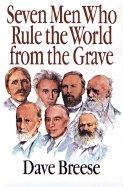 The Power of Ideas
The Power of IdeasAt the beginning of my first semester of CDT, the class was assigned the book “Seven Men Who Ruled the World from the Grave” by Dave Breese. We then were instructed to write a short essay on why we were assigned the book. The book didn’t impress me; it lacked style and footnotes. My essay reflected my disappointment with Breese’s underlying biases. Writing from a Fundamentalist perspective, Breese shaped how his readers would act and respond to the facts he presents in the book that bothered me. My essay missed the mark because I failed to over look Breese's agenda and see his point: Ideas rule the world, not men.
John Maynard Keynes understood the power of ideas. In the final paragraph in his General Theory of Employment, Interest, and Money, he wrote:
...the ideas of economists and political philosophers, both when they are right and when they are wrong, are more powerful than is commonly understood. Indeed, the world is ruled by little else. Practical men, who believe themselves to be quite exempt from any intellectual influences, are usually the slaves of some defunct economist. Madmen in authority, who hear voices in the air, are distilling their frenzy from some academic scribbler of a few years back. I am sure that the power of vested interests is vastly exaggerated compared with the gradual encroachment of ideas. Not, indeed, immediately but after a certain interval; for in the field of economic and political philosophy there are not many who are influence by new theories after they are twenty five or thirty years of age, so that the ideas are not likely to be the newest. But, soon or late, it is ideas, not vested interests, which are dangerous for good or evil.
What makes an idea dangerous? Can an idea be dangerous for the good?
No comments:
Post a Comment